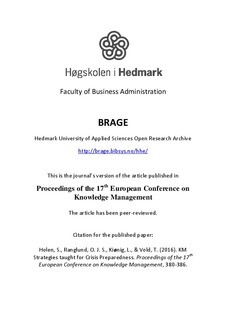| dc.description.abstract | Knowledge Management (KM) is about capturing, distributing and making sense and use of knowledge, as stated by Davenport (1994).Teaching students about how to capture what data, distributing what data and how to make sense and use which knowledge, has become increasingly important as the organizations, both in the private and public sector, have seen the benefits of KM. One area that has singled itself out in Norway, particularly after the terror strike of 22.July 2011, is the need for being prepared for crisis. Both in municipalities and in organizations, the need for capturing, distributing and making sense and use of knowledge that can contribute to avoiding crisis of any kind has become a significant area of interest. However, it is not only about capturing, distributing and making sense and use of knowledge, we claim. It is also about making students capable of capturing, distributing and making sense and use of the knowledge. We have thus seen the need for enabling by empowering the students and provide them with knowledge on how to be able to conduct KM. The paper will describe how this is undertaken in a course at Hedmark University of Applied Science. The main feature is about providing the students with knowledge on how to discover, analyze and handle cases. It is explained how the students are trained to discover, discuss, analyze and handle different cases plenary in smaller and larger groups. The data the paper is based on are collected by group interviews. The students report on increased Learning outcome and being more qualified to solve, and prevent, issues (like potential crisis) in their own organization. Both researchers and students have used member checking to validate and secure credibility and improve the accuracy of the data. | nb_NO |

